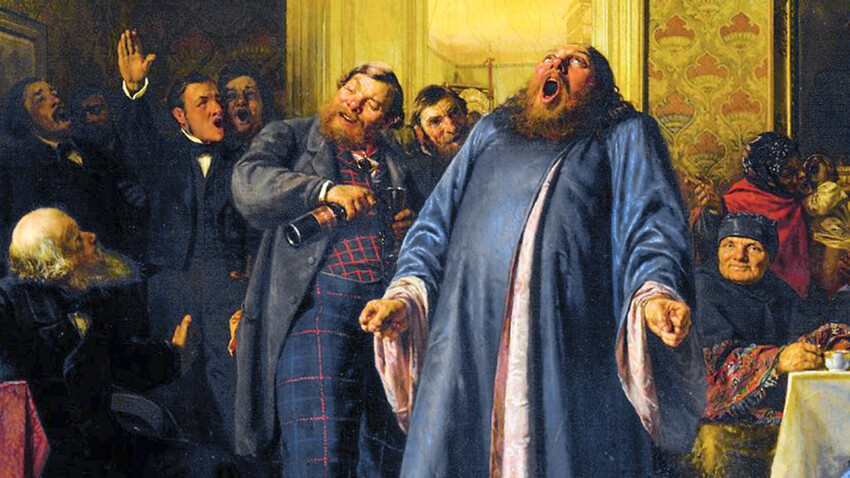
"Protodeacon singing at a merchants' nameday"
Nikolai NevrevAcross most of Russia before the 1917 Revolution, the holiday associated with a person's birth was considered not the day of birth itself, but rather, the day of baptism. For your average peasant, this was quite normal and logical. Since there was little medical care in the Russian countryside, often in the first few days after birth it was unclear whether the baby would survive. In order not to ‘attract evil spirits’, before the baby was baptized the parents preferred not to hurry to tell everyone about its birth.

"The Baptism," Akim Karneev
Akim KarneevIf it seemed that the child might soon die, then parents asked a priest to come quickly. After all, an unbaptized person, even if only a few hours old, would not go to heaven and might harass his parents after death. The belief in this was so strong that if a priest wasn’t anywhere nearby then a midwife had the authority to baptize a baby, giving a name and sprinkling it with holy water.
If the child was healthy and strong, however, then there was no need to hurry with the baptism. There was time to invite the potential godparents, and to prepare for the feast. Healthy children were baptized on the third or eighth day after birth.
When a child was baptized, he was given the name of a saint, whose veneration fell on the day corresponding to his baptism. However, if parents did not like the saint’s name, they could baptize a child with the name of any one of the saints on nearby days.

"A new acquaintance", Kirill Lemokh
Kirill Lemokh/Russian MuseumAfter the baptism the husband could finally spoil his wife with gifts, and relatives could congratulate the young parents. The child received a patron saint, a protector in the spiritual world, who was to be honored accordingly. On the day of their baptism, the children of nobles were presented with an icon of their patron saint.
In Imperial Russia, people celebrated his or her “name day” (known as “angel’s day” in Russian) and not his or her birthday. On this day, it was customary to go to church in the morning. The “name day child” had to take communion. In the evening there was a festive dinner, and guests were invited for pies. The nobility and imperial family had a custom on the name day to send out pies and buns – there was a tradition on one’s name day to eat baked products and pastries, and then treat relatives.
However, all this was valid only for the wealthy. Poor peasants seldom celebrated their name day because it was not a popular holiday. Rather, it was a private affair, which meant that the village community did not exempt them from work on that day. Still, everybody did their best to organize some kind of celebration and offer gifts to relatives.

"At the Repins"
Yuri RepinRussia’s tsars were the first to start celebrating their birthdays. Tsar Fedor Alexeyevich first celebrated his birthday on May 30 (June 9), 1676 – when he turned 15. Gradually, other tsars also started celebrating their birthdays. Peter the Great celebrated his birthday several times, including while he was abroad.
The tradition of celebrating birthdays did not appear among the common Russian folk until the 19th century, when rich merchants and noblemen started holding gala events on this day – just like the tsars did. It is significant that 19th century nobles knew the day of their birth. Unlike peasants, merchants and nobles were literate, able to read time by a clock and calendar.
READ MORE: How did Russian tsars celebrate their birthdays?
In the late 19th century, "name days" of the tsar, tsarina, and all members of the royal family were celebrated on the state level with church services throughout Russia. But when the Bolsheviks came to power, the tradition of celebrating one's “angel's day” died out as part of the anti-religious campaign.

"Name day of the governor general." You can see a deputation of merchants greeting the governor on his name-day with a large pie and a basket of sturgeons.
Leonid SolomatkinThe abolition of religion was not the only reason to abolish name days. In the early years of Soviet power, the Leninist government began to develop the infrastructure of the new state, organizing, among other things, civil registration offices, mass medical care, and the elimination of illiteracy. Thanks to a combination of these factors, citizens began to know when their birthdays were and were no longer afraid to celebrate their children's birthdays.
In a rapidly growing industrial society, perinatal care became widespread. Infant health was no longer the responsibility of midwives and village doctors, but rather of medical personnel; thus, there was no need to fear bad omens and superstitions.
Throughout the 20th century, Russians still celebrated their name days, and most still know on which day of the year it occurs. However, only religious people still celebrate their “angel days.”
If using any of Russia Beyond's content, partly or in full, always provide an active hyperlink to the original material.
Subscribe
to our newsletter!
Get the week's best stories straight to your inbox